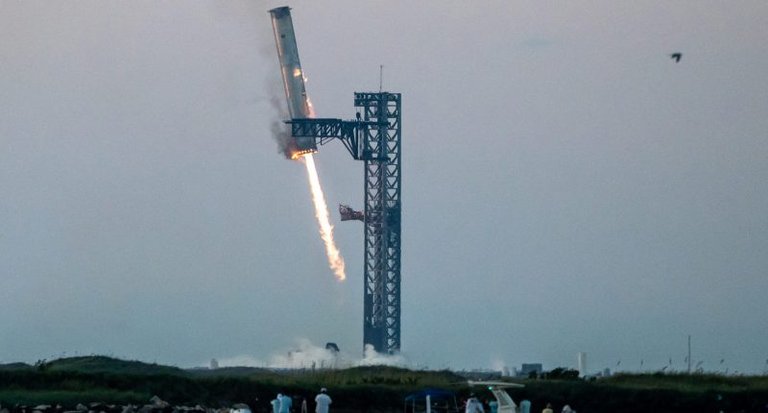SpaceX catches Starship booster mid-air in historic feat

SpaceX has now achieved a historic new milestone – this time, the space company successfully captured the Super Heavy booster from its Starship rocket as it descended back to the launchpad in southern Texas. This development comes a few months after the space company achieved its first successful splashdown with its Starship vehicle, and marks the fifth test flight of the Starship rocket.
The mission commenced at 7:25 AM local time from the Boca Chica starbase, with the Starship rocket lifting off under clear skies. The rocket stands 397 feet (121 meters) tall once it is fully assembled. During the launch, the Super Heavy booster separated from the upper stage at an altitude of 40 miles (65 kilometers). The upper stage then proceeded to reach an altitude of nearly 90 miles, completing a fast-paced orbit around the Earth at approximately 17,000 mph. Once the objectives were achieved, the upper stage successfully splashed down in the Indian Ocean.
As the Super Heavy booster re-entered the atmosphere, it ignited three of its Raptor engines to decelerate, thus aligning itself for a landing at the launchpad. This recovery process involved the use of the “Mechazilla,” large mechanical arms on the pad gantry that have been designed to catch the descending booster and hold it securely at the launch pad. This is a big step – it marks the first time SpaceX has executed such a maneuver and achieved success, and if this success continues, then it will massively increase the reusability of rocket components. It also allows rockets to return directly to the launch site instead of landing on distant platforms or in the ocean, and cuts down on the time required to refurbish and prepare the rockets for future launches.
“Folks, this is a day for the engineering history books,” a spokesperson for SpaceX. “The tower has caught the rocket!!” Elon Musk, SpaceX founder, posted on social media platform X. The company went on to reveal that its engineers have “spent years preparing and months testing for the booster catch attempt, with technicians pouring tens of thousands of hours into building the infrastructure to maximize our chances for success.”
This comes after the upper stage faced challenges during the re-entry – the separation from the booster was followed by the Starship utilizing its improved heat-shielding tiles to protect against the extreme temperatures generated during re-entry. The vehicle eventually successfully landed in the Indian Ocean, but managed to tip over and explode upon hitting the water. It is unknown whether the explosion was a controlled detonation or not, but Musk said the ship landed “precisely on target!”